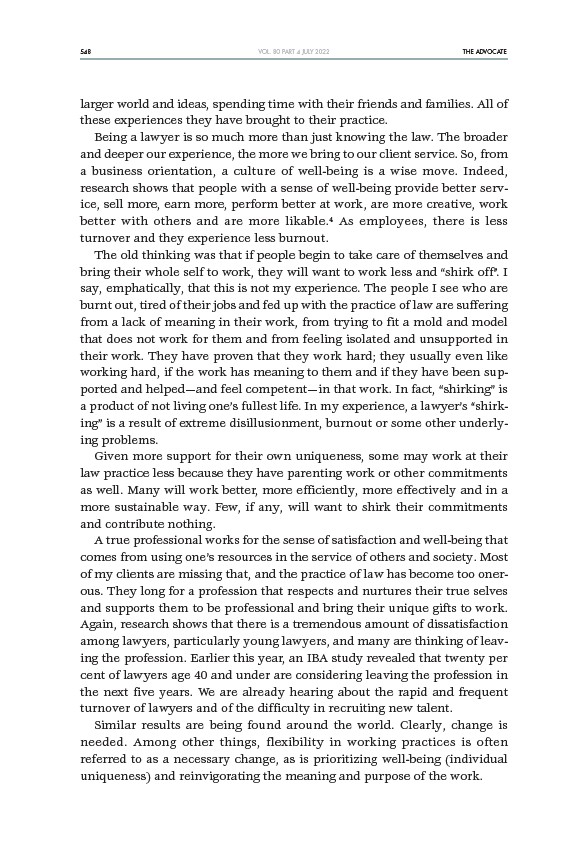
548 THE ADVOCATE
VOL. 80 PART 4 JULY 2022
larger world and ideas, spending time with their friends and families. All of
these experiences they have brought to their practice.
Being a lawyer is so much more than just knowing the law. The broader
and deeper our experience, the more we bring to our client service. So, from
a business orientation, a culture of well-being is a wise move. Indeed,
research shows that people with a sense of well-being provide better service,
sell more, earn more, perform better at work, are more creative, work
better with others and are more likable.4 As employees, there is less
turnover and they experience less burnout.
The old thinking was that if people begin to take care of themselves and
bring their whole self to work, they will want to work less and “shirk off”. I
say, emphatically, that this is not my experience. The people I see who are
burnt out, tired of their jobs and fed up with the practice of law are suffering
from a lack of meaning in their work, from trying to fit a mold and model
that does not work for them and from feeling isolated and unsupported in
their work. They have proven that they work hard; they usually even like
working hard, if the work has meaning to them and if they have been supported
and helped—and feel competent—in that work. In fact, “shirking” is
a product of not living one’s fullest life. In my experience, a lawyer’s “shirking”
is a result of extreme disillusionment, burnout or some other underlying
problems.
Given more support for their own uniqueness, some may work at their
law practice less because they have parenting work or other commitments
as well. Many will work better, more efficiently, more effectively and in a
more sustainable way. Few, if any, will want to shirk their commitments
and contribute nothing.
A true professional works for the sense of satisfaction and well-being that
comes from using one’s resources in the service of others and society. Most
of my clients are missing that, and the practice of law has become too onerous.
They long for a profession that respects and nurtures their true selves
and supports them to be professional and bring their unique gifts to work.
Again, research shows that there is a tremendous amount of dissatisfaction
among lawyers, particularly young lawyers, and many are thinking of leaving
the profession. Earlier this year, an IBA study revealed that twenty per
cent of lawyers age 40 and under are considering leaving the profession in
the next five years. We are already hearing about the rapid and frequent
turnover of lawyers and of the difficulty in recruiting new talent.
Similar results are being found around the world. Clearly, change is
needed. Among other things, flexibility in working practices is often
referred to as a necessary change, as is prioritizing well-being (individual
uniqueness) and reinvigorating the meaning and purpose of the work.